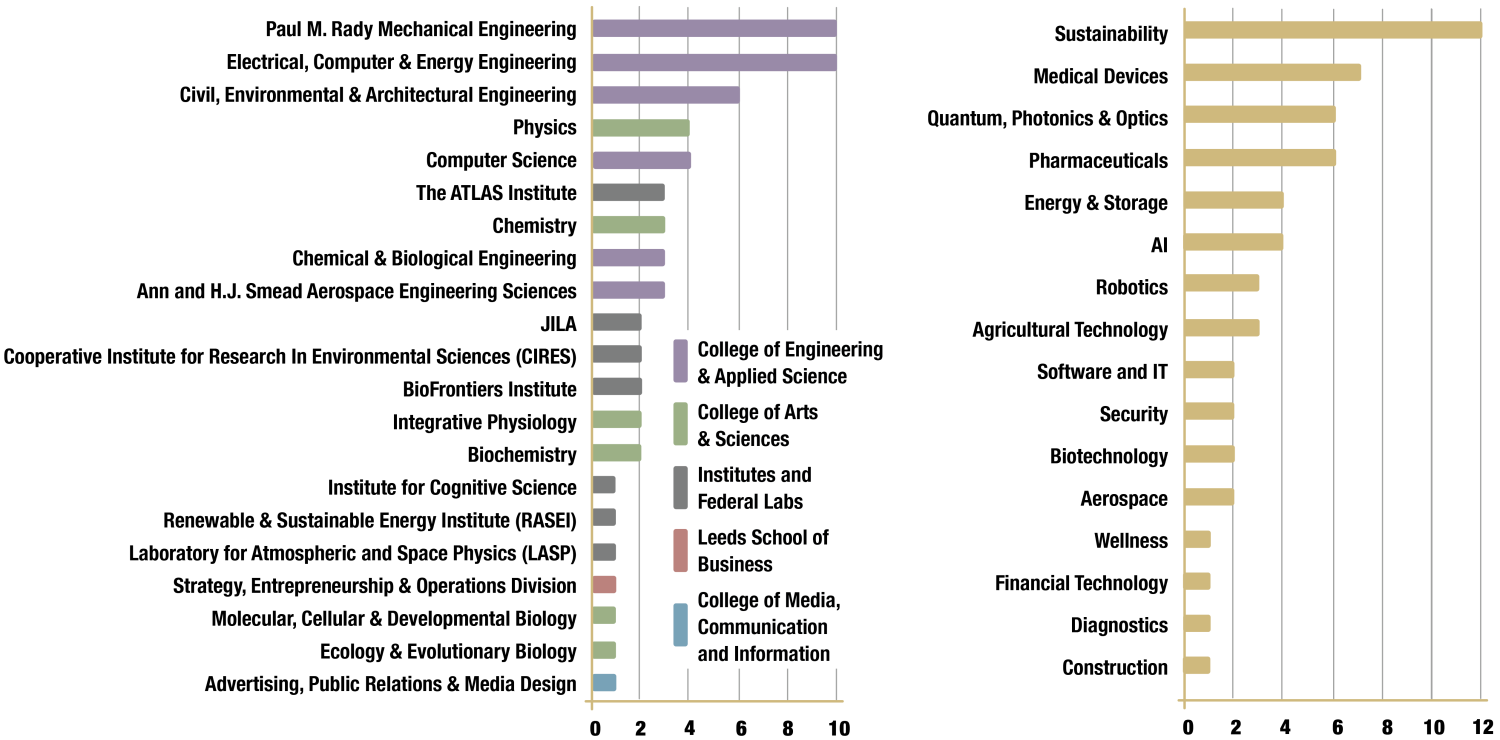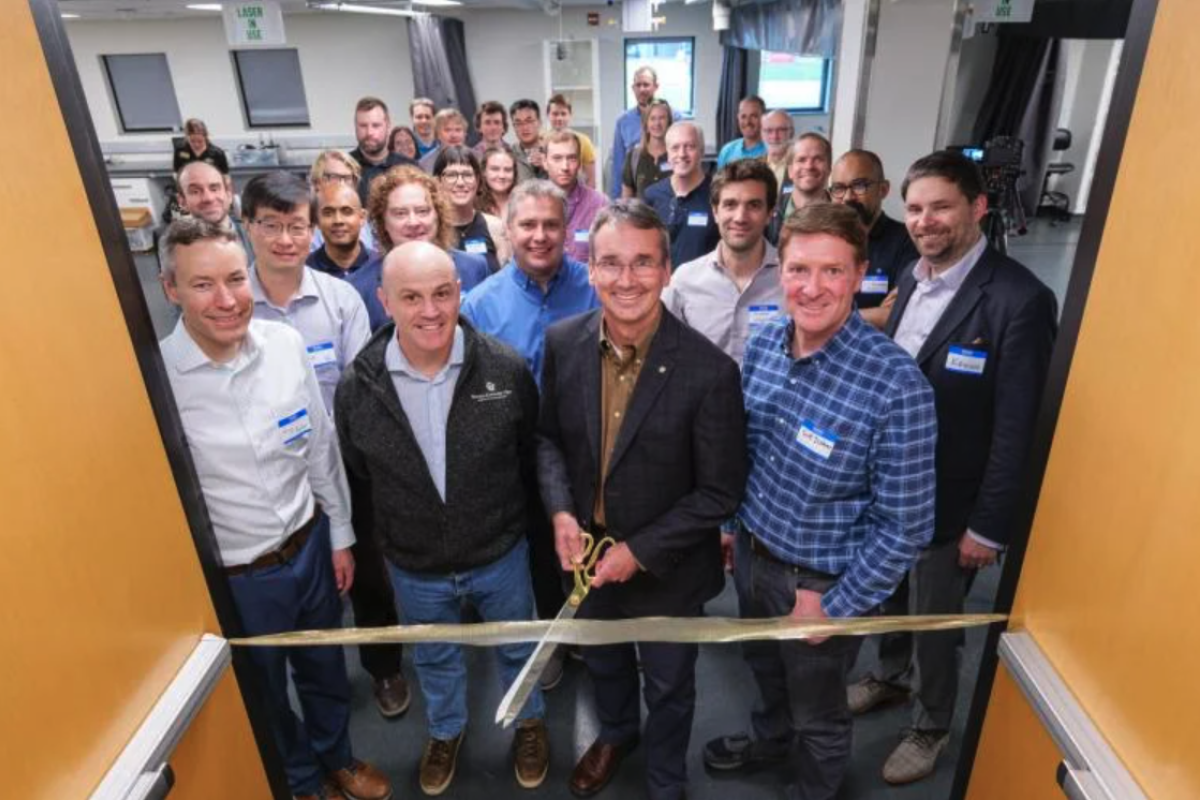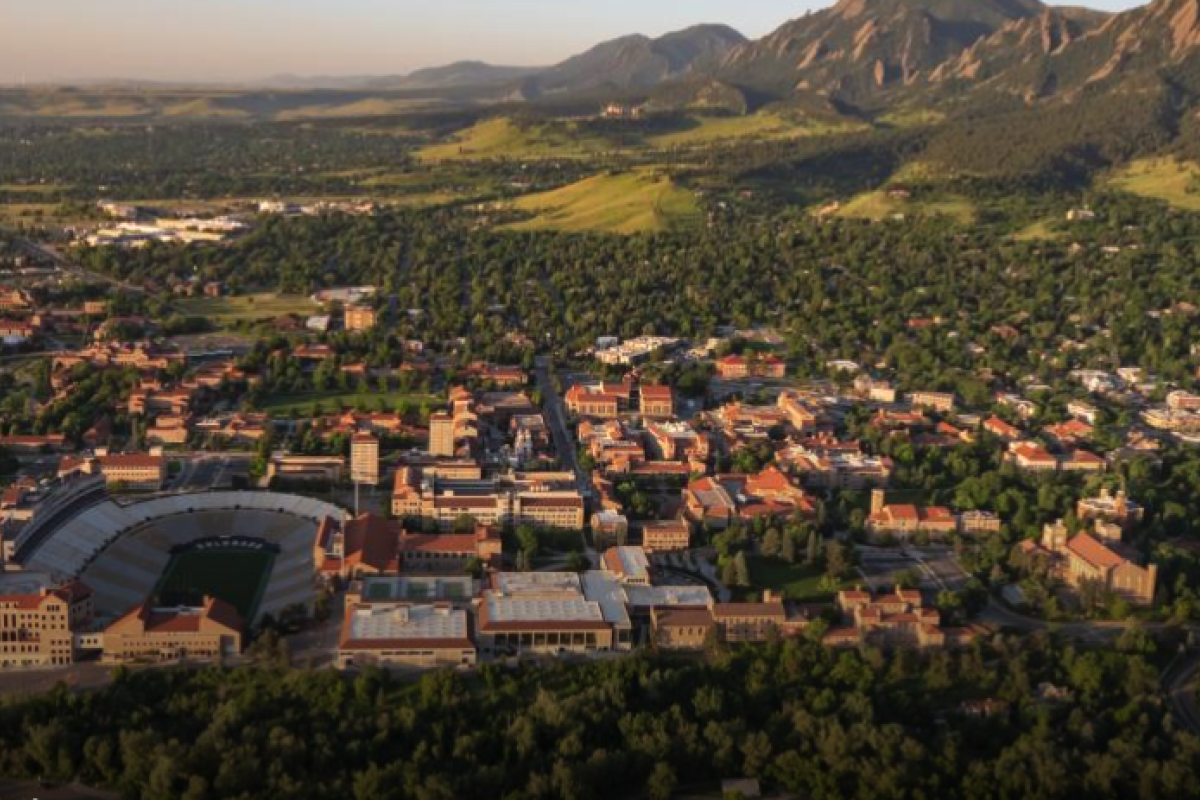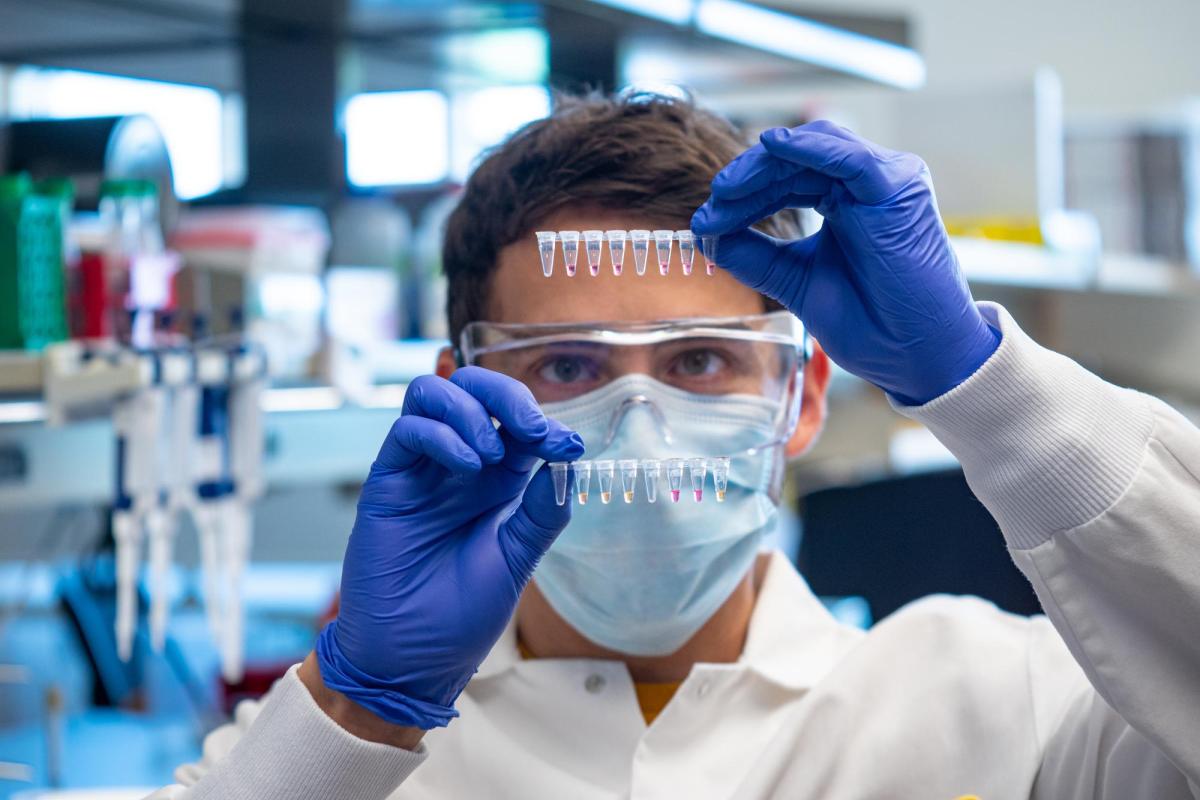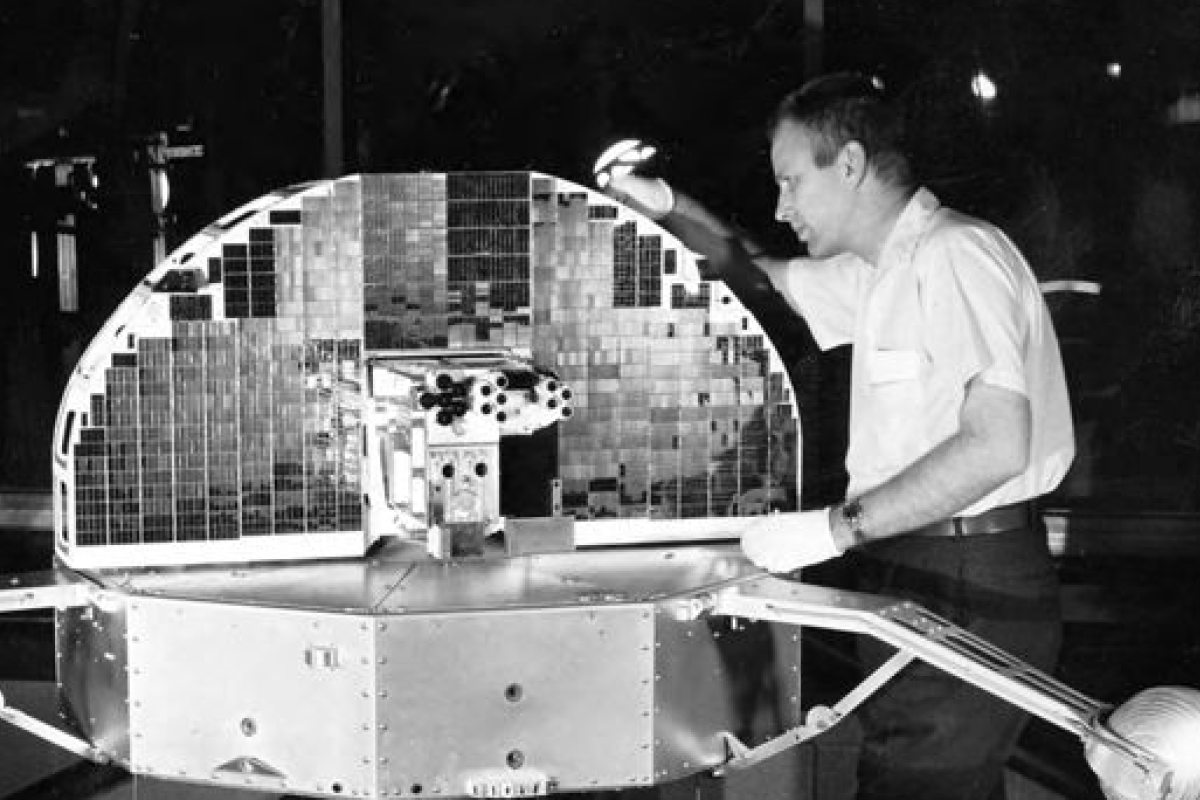Venture Partners Annual Report
Nicole Xu, assistant professor in mechanical engineering, showcasing her lab's bio-inspired design for robotic jellyfish. Read More
Measuring Impact in Fiscal Year 2023-24
36
Startups launched—35 from CU Boulder and 1 from CU Denver
$426M
Capital raised by portfolio companies
$32M
Revenue from commercialization to CU Boulder since 2019
63
National Science Foundation I-CorpsTM teams trained through Venture Partners
94
License and option agreements
A Message From our Leadership
CU Boulder is a destination of choice for innovation, and we are fortunate to be a part of the world-class innovation ecosystem along Colorado’s Front Range. Our community thrives through its collaborative “give first” spirit, talented and committed network of entrepreneurs, and deep expertise across many industries, including bioscience, sustainability, quantum and aerospace.
Venture Partners is the university's commercialization arm for CU Boulder, physical sciences at CU Denver and UCCS; our role is to support researchers, entrepreneurs, industry partners and investors who want to transform the world. Translating discoveries at the university into new solutions, businesses and partnerships is part of the University of Colorado’s commitment to serving the public. This report celebrates many of Venture Partners’ successes in FY 2023-24, as we turn breakthrough research into real-world impact.
CU Boulder had an incredible year spinning out 35 startups, each built upon a unique university innovation. This is the most ever for CU Boulder, surpassing the prior record of 20 companies in FY 2020-21. Before this year, only Stanford University had created more startups in a single year. Read more in our special coverage here.
Each of the companies launched represents years of cutting-edge research and countless hours forging the startup’s strategy. The latter is what sets Venture Partners apart, providing resources and programs to help aspiring founders explore and test product-market fit, find mentors and funding, and accelerate their ideas toward a high-growth company.
New in FY 2023-24, and a significant driver of new startups, is the Embark Deep Tech Startup Creator. While many of our faculty, graduate students and post-doctoral researchers have the entrepreneurship bug, starting a new company is not for everyone. Embark pairs promising university innovations with experienced community entrepreneurs to form new kinds of startup companies that go beyond the traditional academic-founder model.
2024 also included landmark success for the broader innovation ecosystem: a $160 million award from the U.S. National Science Foundation to form the Colorado-Wyoming Climate Resilience Engine, and a total of $127 million in federal and state funding for the Elevate Quantum tech hub. CU Boulder, and Venture Partners, played important roles in both and will be a source of new innovations and ventures in climate resilience and quantum.
Venture Partners has worked over many years to build the foundation for our present success. We are so proud of this team of scientists, engineers, entrepreneurs, attorneys and other professionals and their passion for bringing CU’s innovations to the world.
We also want to share our gratitude for our partners: the inventors and collaborators from all corners of the university and our mentors, investors, companies and startup support organizations who together form this powerful ecosystem
Enjoy this compilation of commercialization activity; we look forward to continuing to grow together in 2025.

Bryn Rees
Associate Vice Chancellor for Innovation and Partnerships
Massimo Ruzzene
Senior Vice Chancellor for Research and Innovation and Dean of the Institutes
$1.2B Raised by Companies Built on CU Boulder Innovations in FYs 2022-24
Financing Type | Number of Financings | Total Amount |
|---|---|---|
Competition/Accelerator | 6 | $793,000 |
Grant | 52 | $80,595,000 |
Pre-Seed | 3 | $4,300,000 |
Seed | 11 | $3,941,818 |
Series A | 8 | $108,300,000 |
Series B | 3 | $187,000,000 |
Series C/D | 8 | $472,400,000 |
PIPE | 1 | $65,000,000 |
Loan | 1 | $189,000,000 |
Bridge/Other | 6 | $59,500,000 |
Merger/Acquisition | 2 | $62,500,000 |
TOTAL | 101 | $1,233,329,818 |
9 Unicorns: All-Time Number of Companies Built on CU Boulder Innovations Valued Over $1B
Those unicorns include:
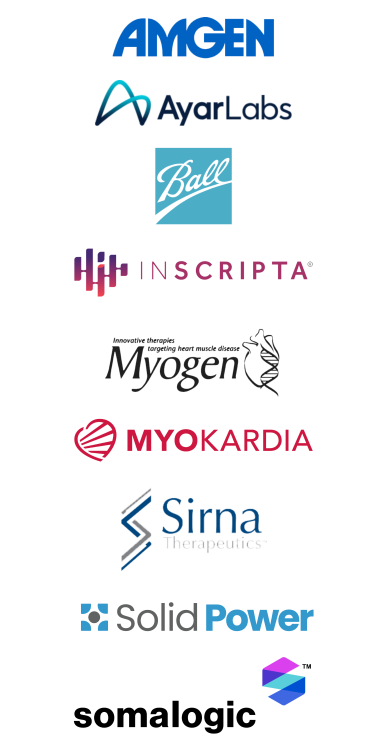
Image Description: Logos of Amgen Inc., Ayar Labs Inc., Ball Aerospace & Technologies Corp., Inscripta Inc., Myogen Inc., MyoKardia Inc., Sirna Therapeutics Inc., Solid Power Inc., SomaLogic Inc.
Telling Our Stories
The Insider is Venture Partners at CU Boulder's monthly newsletter featuring the latest headlines, news, events, opportunities and emerging innovations from the university. Subscribe Now
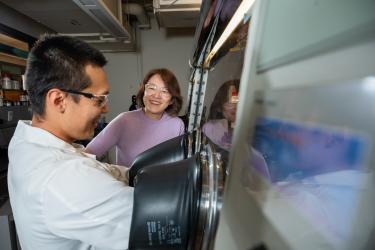
CU Boulder shines with record-breaking year for startups
Innovation at CU Boulder reached an unprecedented milestone in FY 2023-24 by launching 35 startup companies based on university innovations. This achievement shattered CU Boulder’s previous record of 20 startups in FY 2021 and placed it among the most prolific single-campus institutions in the country.
This leap from launching just four to six startups annually a decade ago is a testament to years of strategy and investment in entrepreneurship. Considering CU’s location outside traditional venture capital hubs like Silicon Valley and Boston, its rise as a startup powerhouse showcases a unique ecosystem driving extraordinary results. Read More
CU Boulder Today—Elevate Quantum, of which CU Boulder is a key partner, announced today that it has received a Tech Hub Phase 2 implementation award from the Department of Commerce, unlocking more than $127 million in new federal and state funding. Read More
CU Boulder Today—The National Science Foundation today announced the Colorado-Wyoming Climate Resilience Engine (CO-WY Engine) as a recipient of its inaugural Regional Innovation Engines program. The prestigious award totals up to $160 million over 10 years and positions the CO-WY Engine at the forefront of the nation's environmental and climate technology initiatives. Read More
CU Boulder researchers attracted a record $742.2 million in fiscal year 2023–24 for studies and initiatives that, among other things, could lead to an end of osteoarthritis, better space weather predictions and a more climate-resilient American West. Read More
According to the latest report from the Association of University Technology Managers, which assessed startup creation by universities in 2021, CU ranked fifth nationwide, ahead of Stanford and MIT. CU Boulder produced 20 startups that year and has spun out 179 companies to date. The pace of startup formation is surging, having nearly doubled in recent years. Read More
CU Boulder and Ball Aerospace have been collaborating for decades to solve mysteries of the universe. That partnership was also the university’s first commercial spin-off and it greased the gears of an entrepreneurial engine that continues to power innovation within the university and far beyond. Read More
Founded by CU Boulder Professor Larry Gold in 2000, SomaLogic revolutionized protein measurement by developing a faster, cost-effective process to monitor the vast number of proteins in the human body. Read More
Developing Real-World Readiness
Our programs go beyond the traditional technology transfer model to support researchers-turned-founders and innovative entrepreneurs in scaling successful, sustainable businesses.
New Approaches to Launching Companies

Embark Deep Tech Startup Creator
With myriad CU Boulder technologies ready to make a real-world impact, Embark connects them to motivated entrepreneurs ready to launch new companies. The program provides intellectual property rights, salary support, grant funds and investor introductions to selected entrepreneurs.
Key FY 2023-24 Results
Entrepreneurs reviewed 50 technologies and pitched 30 startup ideas at the semifinal competition for Embark 2024 and 10 joined the second cohort of Embark Entrepreneurs in Residence. The cohort will work through a six-month program including launching and accelerating their companies, customer discovery and competing for additional funding.

Ascent Deep Tech Accelerator
Ascent is an accelerator for research teams building deep tech startups coming out of the University of Colorado campuses in Boulder, Colorado Springs and Denver. Deep tech startups face unique challenges because of their disruptive nature, intensive research and development, and significant capital requirements. Leveraging ecosystem experts, a robust mentor network and Venture Partners staff, early-stage companies accelerate their viability and traction over four months leading up to a final investor showcase.
Key FY 2023-24 Results
Ascent has graduated 35 companies since 2021 that have raised $15 million in nondilutive funding (including LVC; OEDIT ESCR; SBIR from DOE, NASA, NSF, SpaceWERX, Army etc.) and over $21 million in seed funding from prominent venture capitalists. Ascent companies have also advanced to programs such as NREL West Gate, Creative Destruction Lab, Techstars and Activate.
Empowering Innovators
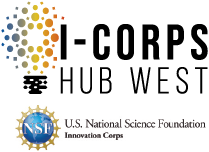
National Science Foundation I-Corps Hub: West Region
A $15 million National Science Foundation (NSF) award cultivates innovations and ventures at research universities in the western U.S. through the I-CorpsTM Hub: West Region. CU Boulder’s leadership has brought nationally recognized instructors and business mentors and new entrepreneurial opportunities into the state of Colorado.
In Partnership With

University of Colorado, UCLA, UC Santa Barbara, The University of New Mexico, UC Riverside, Colorado School of Mines, Colorado State University, University of Southern California, Caltech, The University of Utah
Starting Blocks Customer Discovery Workshop
Offered by Venture Partners, this is the shortest, “introductory” version of the I-Corps methodology, which helps researchers, inventors and problem solvers from any research or community institution build a customer discovery toolkit and learn to talk to industry and business funders about their innovations.
Key FY 2023-24 Results
63 teams from multiple institutions were trained through the Starting Blocks programming provided by Venture Partners.
Research-to-Market (R2M) Customer Discovery Program
Offered by Venture Partners, this four-week I-Corps program walks researchers, inventors and problem solvers from any research or community institution through the customer discovery process and pushes them to think about how their innovations can be adopted in markets in consultation with experienced mentors and advisors.
Key FY 2023-24 Results
32 teams from multiple institutions were trained by the R2M programming provided by Venture Partners.
National I-Corps Teams Program
Teams accepted into the NSF I-Corps National Teams training program can receive up to $50,000 to support their participation, including stipends and expenses for virtual and in-person customer discovery, as they engage with prospective customers, partners and others over seven weeks to evaluate the commercial potential of their technologies.
Key FY 2023-24 Results
3 CU Boulder teams and 1 CU Denver team were accepted into NSF National I-Corps, each winning $50,000 to support commercialization of their breakthrough technologies.
Moving at Market Speed

Through the Lab Venture Challenge (LVC), top innovations from University of Colorado Boulder, Denver and Colorado Springs compete for grants of up to $125,000. LVC supports projects that address a commercial need, have a clear path to a compelling market and have strong scientific support.
In Partnership With
Colorado Office of Economic Development & International Trade (OEDIT)
Key FY 2023-24 Results
LVC awarded ten $125,000 grants and two $132,505 grants to promising CU Boulder, Denver and UCCS startups—a total of $1,515,000 in grant funding. To date, LVC winners have received over $350 million in follow-on funding.

Destination Startup® brings groundbreaking researchers together with investors from throughout North America to catalyze real-world impact. This showcase demonstrates a powerful way to advance innovative research and translate it into impactful business ventures.
In Partnership With

Arizona State University, Colorado School of Mines, Colorado State University, Montana State University, National Institute of Standards and Technology (NIST), National Renewable Energy Laboratory (NREL), The University of Arizona, University of Colorado, University of Denver, The University of Kansas, University of Nebraska Medical Center, The University of New Mexico, The University of Utah, University of Wyoming
Key FY 2023-24 Results
Presenting teams have successfully raised over $1.2 billion in capital, including $872 million in venture funding and $362 million in grant and other non-dilutive funding. Teams that participated in 2024 presented to over 200 attendees.
Buff Venture Fund

Launched in 2022, the Buff Venture Fund is a private venture capital fund that invests in startup companies connected to CU Boulder. CU Boulder has a formal partnership with Buff Gold Ventures to grow startup companies and identify investment opportunities collaboratively.
Current Investments
Tynt Technologies, Vitro3D, LongPath Technologies, VitriVax, Think BioSciences, Polaris Electro-Optics, SinusLogic, Mana Battery, BoCo Bio, Vycarb, CodeBreaker
“Our investments showcase disruptive improvements in climate tech, advanced manufacturing and chips, and drug discovery or delivery. Through our investments and the 100+ companies we’ve advised, we are proud to partner with Venture Partners to build a vibrant, supportive ecosystem for CU and the next generation of inventors and founders.”—Sally Hatcher and Mark Lupa, Co-Founders and General Partners of Buff Gold Ventures
World-Changing Companies
Venture Partners has launched has launched more than 220 startups based on university innovations. Here are just a few.
Startup Exits in FY 2023-24:LiteWave Technologies, Ball Aerospace, OnKure Therapeutics

Eat Meati™ (Meati Inc.)
Eat Meati™ (Meati Inc.) believes food should be simple, clean and delicious. That’s why they do everything, from growing and nurturing their mushroom root main ingredient to creating nutrient-rich, sustainable, whole-cut products.
Industry: Environmental and Sustainability, Food and Agriculture
Within months of beginning to collaboratively research mushroom root (mycelium) together as CU Boulder PhD students, Tyler Huggins (Civil, Environmental and Architectural Engineering) and Justin Whiteley (Mechanical Engineering) knew they had a nature-based tool for taking on many global issues. Read More
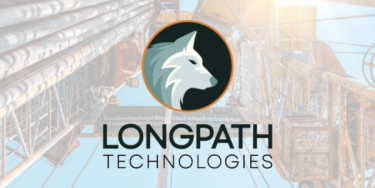
LongPath Technologies Inc.
Continuous methane emissions monitoring for the oil and gas industry that reduces data liability, relieves the risk of super emitters and delivers on voluntary and regulatory compliance frameworks.
Industry: Environment and Sustainability, Cleantech, Hardware and Instrumentation, Optics, Quantum
LongPath Technologies was co-founded by Greg Rieker (CU Boulder Paul M. Rady Mechanical Engineering and National Institute of Standards and Technology (NIST)) to address the growing need for effective methane detection solutions in the oil and gas industry. Read More
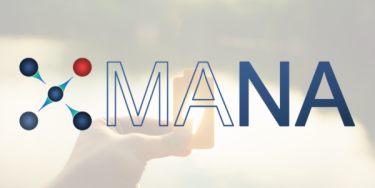
Mana Battery Inc.
Pioneering sodium-based battery technology that rivals lithium-ion batteries in energy density at 35-75% of the cost, focusing on safety and long cycle life.
Industry: Environment and Sustainability, Cleantech, Advanced Materials
Mana Battery Inc. (Mana) was founded as a spinout of Chunmei Ban’s laboratory (CU Boulder Paul M. Rady Mechanical Engineering) in October 2023 to commercialize best-in-class sodium battery technology. Read More
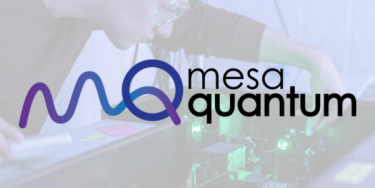
Mesa Quantum Inc.
Developing advanced chip-scale quantum sensing for next-generation position, navigation and timing capabilities.
Industry: Hardware and Instrumentation, Quantum, Aerospace, Advanced Materials, Robotics, Optics
Venture Partners helped match a motivated grad student, Sristy Agrawal (NIST, CU Boulder Mathematical Physics), with a novel atomic clock invented in Svenja Knappe’s lab (CU Boulder Paul M. Rady Mechanical Engineering). Read More
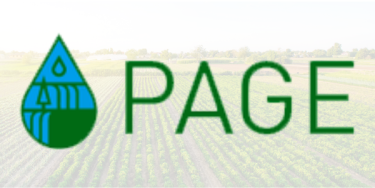
PAGE Technologies
Introducing the world's most affordable water and soil monitoring for instant and continuous data capture.
Industry: Environment and Sustainability, Cleantech, Artificial Intelligence (AI) and Machine Learning, Food and Agriculture
PAGE Technologies was founded in 2023 by Elliot Strand (CU Boulder College of Engineering and Applied Science) and Payton Goodrich to commercialize their innovative low-cost environmental monitoring platform, developed during a collaborative research project as PhD students at CU Boulder and UC Berkeley, respectively. Read More
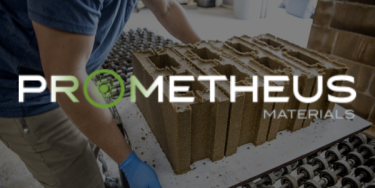
Prometheus Materials Inc.
Inspired by the composition of coral and seashells, their process combines microalgae with other natural components to form a zero-carbon bio-cement and bio-concrete.
Industry: Manufacturing, Environment and Sustainability, Cleantech, Advanced Materials
Prometheus Materials Inc., was co-founded by four faculty members at CU Boulder: Wil Srubar, Sherri Cook, Mija Hubler (CU Boulder Civil, Environmental and Architectural Engineering) and Jeff Cameron (CU Boulder Biochemistry). Read More
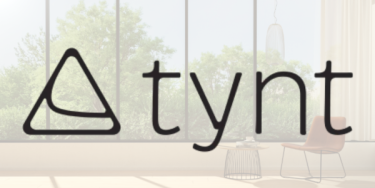
Tynt Technologies Inc.
Elegant, ultra-climate-friendly windows adapt to changing needs throughout the day, giving complete control of visible light and solar heat gain.
Industry: Manufacturing, Environment and Sustainability, Cleantech, Smart Cities, Advanced Materials
Tynt Technologies was founded in 2020 by Michael D. McGehee (CU Boulder Chemical and Biological Engineering) and his then PhD students Tyler Hernandez and Michael Strand. Read More
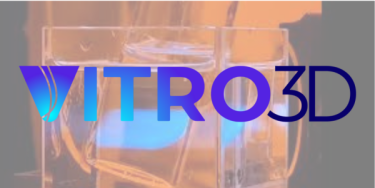
Vitro3D Inc.
Vitro3D is bringing dental aligner manufacturing to the patient's point of care using a brand-new volumetric 3D printing method.
Industry: Advanced Materials, Health and Wellness, Hardware and Instrumentation
Vitro3D was founded in 2020 by Camila Uzcategui and Johnny Hergert to bring to market their revolutionary volumetric 3D printing technology developed while PhD students in Bob McLeod's lab (CU Boulder College of Engineering and Applied Science). Read More
Groundbreaking Discoveries
Venture Partners has signed over 648 license and option agreements with a portfolio of over 1,484 inventions.
45
U.S. patents were issued for CU inventions through Venture Partners in FY 2023-24
22
Patents issued in FY 2023-24 are already partnered with new ventures and existing companies (49%)
FY 2023-24 Innovation Disclosures by CU Boulder Unit
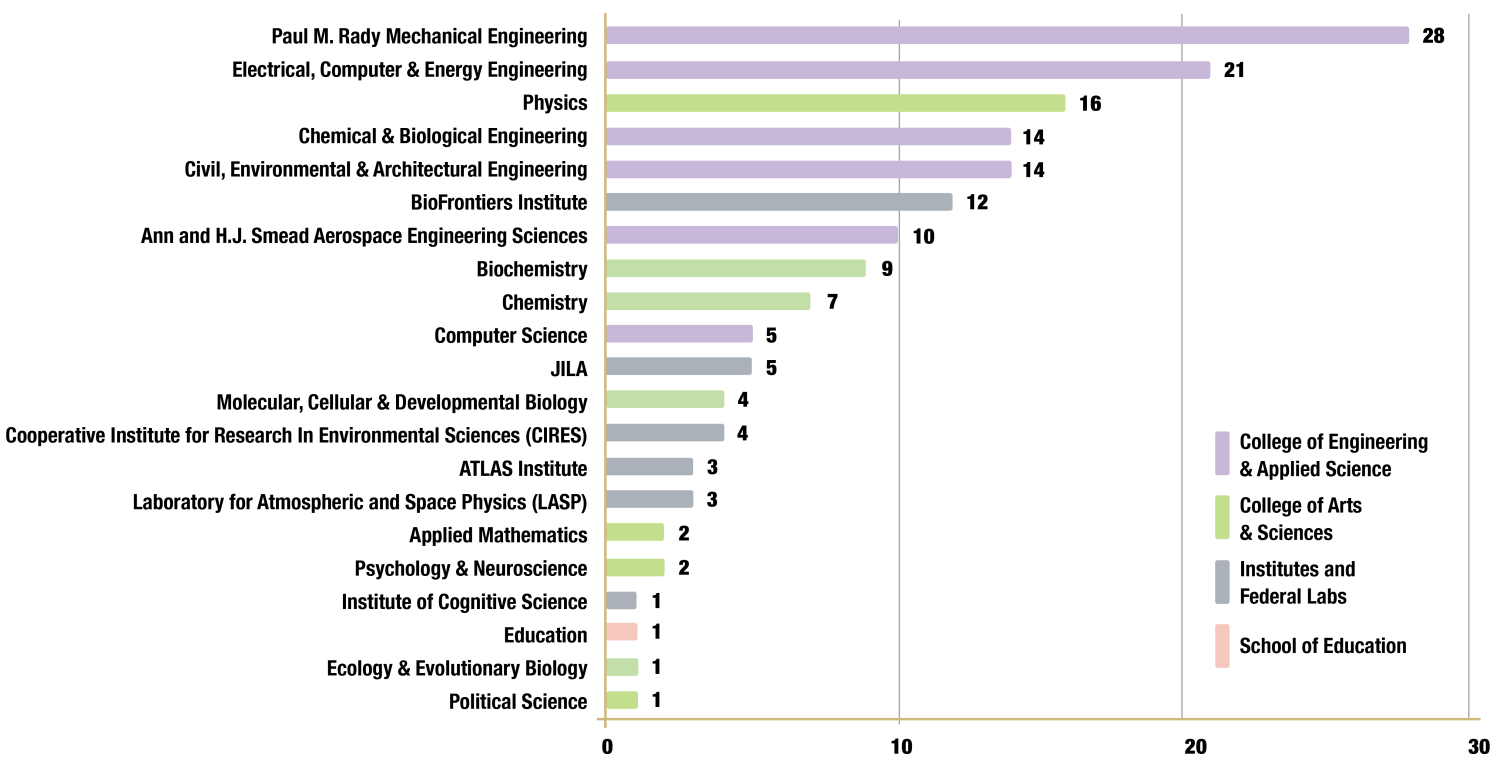
Image description: Bar graph depicts disclosures by CU Boulder unit: Paul M. Rady Mechanical Engineering, 28; Electrical, Computer & Energy Engineering, 21; Physics, 16; Chemical & Biological Engineering, 14; Civil, Environmental & Architectural Engineering, 14; BioFrontiers Institute, 12; Ann and H.J. Smead Aerospace Engineering Sciences, 10; Biochemistry, 9; Chemistry, 7; Computer Science, 5; JILA, 5; Molecular, Cellular & Developmental Biology, 4; Cooperative Institute for Research In Environmental Sciences (CIRES), 4; ATLAS Institute, 3; Laboratory for Atmospheric and Space Physics (LASP), 3; Applied Mathematics, 2; Psychology & Neuroscience, 2; Institute of Cognitive Science, 1; Education, 1; Ecology & Evolutionary Biology, 1; Political Science, 1
Beyond CU startups, companies licensing CU inventions through Venture Partners include:

Tesla, Lockheed Martin, Pfizer, Toyota, Amgen, 3M, Gilead, Novartis, Shell
For marketing and communication inquiries or news tips, contact Daniel Leonard, senior marketing and communications specialist for Venture Partners at CU Boulder.
For media inquiries, please visit colorado.edu/news/formedia.



